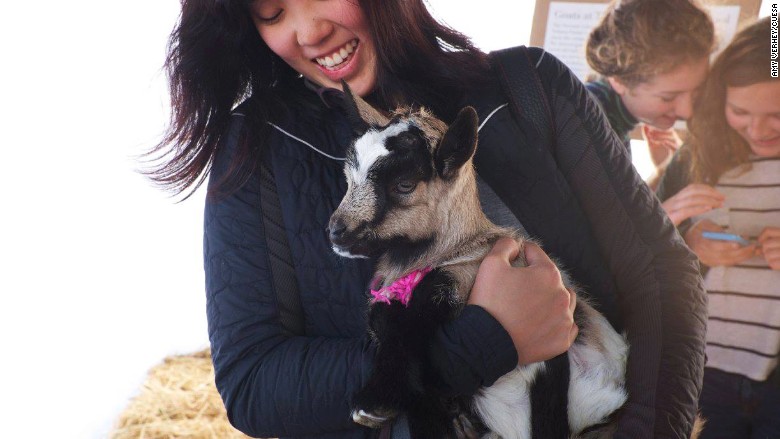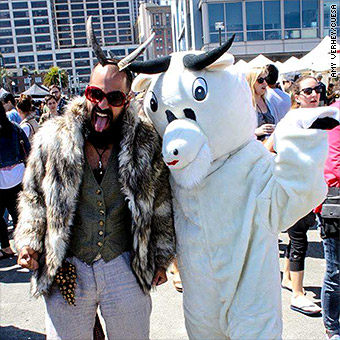
On a Saturday in April, a few thousand people waited in line for several hours to pet some baby goats.
The crowds took over the 7th annual Goat Festival at San Francisco's Ferry Building after a Facebook page for the event unexpectedly went viral.
Every month, 450 million people use Facebook's events listings. Hosts and organizers post private and public events like birthday parties, BBQs, festivals, meet-ups and protests.
Small changes to the tool, made quietly by Facebook (FB) over the past year, are helping turn Facebook Events into a powerful listing resource. RSVPs to public listings have increased across the board, and there's been a surprising side effect: Some events are going viral.
Nine thousand people RSVP-ed for a Japanese lantern festival in Berkeley that usually only gets 100 attendees. Over a thousand people said they'd help build the world's longest ice cream sundae in Michigan. And 17,399 people said they were going to a festival celebrating goats.

The Center for Urban Education about Sustainable Agriculture (CUESA) posted the goat event to Facebook one morning in March. By the next morning, a couple thousand people had RSVPed.
Related: Google introduces smart wifi router
Aditya Koolwal took over Facebook's events product two years ago. The tool was originally designed for planning private parties, but he discovered most listings were actually for public events. His team decided make some long overdue improvements to help those public events thrive.
The main goal was to make events more visible, so people could easily stumble onto local goings-ons. Facebook started showing suggested events in newsfeeds, sandwiched between status updates. It chooses events based on what's nearby or popular with your friends, and shows how many people in your network are going.
What happens next is classic FOMO (fear of missing out). People want to attend the same events as their friends. As more people RSVP, events spread organically through social networks. Events are now seen by a magnitude more people without any extra work by organizers. They don't all take off -- there needs to be some initial interest -- but events that strike a nerve can spread like wildfire.
And so the goats took off. The RSVP tally passed 5,000 and then 10,000. The festival page filled with comments and the kind of camaraderie that comes with shared enthusiasm. A commenter noted it was the same weekend as the music festival Coachella, so they dubbed it "Goatchella."
Organizers had only booked four goats. Unsure of what to expect, they doubled the number of goats and printed up Goatchella t-shits and buttons to sell. The goat cheese tastings and controversial goat cooking demonstration (set up far from the petting tents) stocked up.
Luckily for the goats, attendance at these events is usually far lower than the Facebook RSVPs.
Now, Facebook is testing out ways to make RSVP numbers more realistic. It recently added a save option so people can get updates without committing. It's rolling out subscriptions so people can see upcoming events from specific people or organizations.
CUESA doesn't know if the same response will happen again or if it was a fluke. But organizers are getting a head start on next year's festival, just in case. Employees are already brainstorming ideas for other concert-themed livestock events, like Outside Lambs and Cowapalooza.

